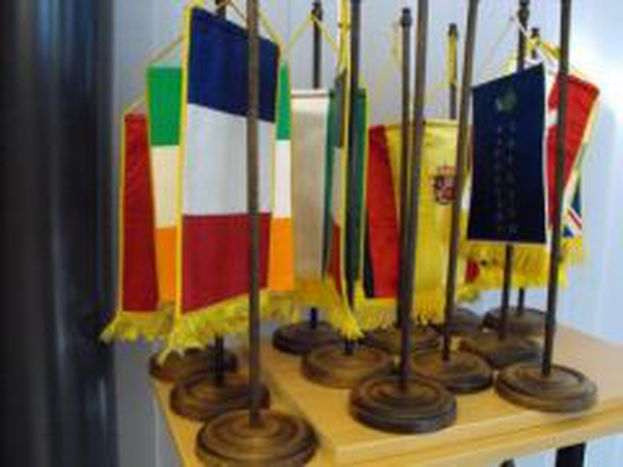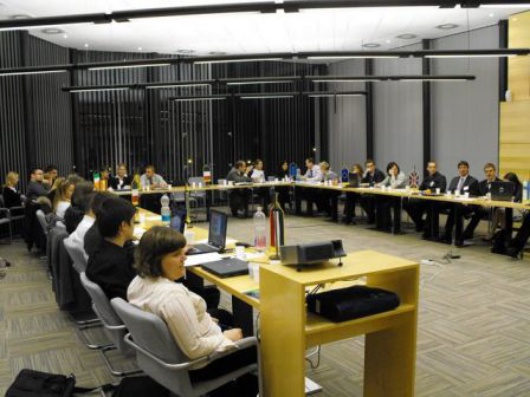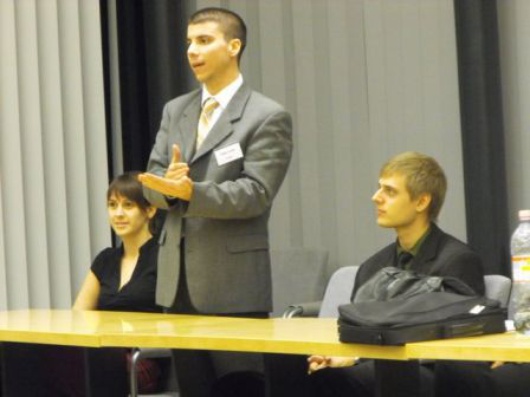
The common budget finally got accepted in Kaposvár!
Published on
Written by Tamás Kéry
One of my friends told me to go. „Okay than we should go” – I said. On the homepage of the collage an EU negotiation simulation training was announced by an organization called Negotiation Moot and I thought it’s going to be interesting and on the other hand I will meet new people and see how „Yrope” is working in the real life.
It would be an overstatement if I told you that twelve stars were my sign in the kindergarten and that I was chatting in the sand about the necessary reforms of the common agriculture. And it is also untrue that in 1989 I was organizing troops to bring down the wall which was separating the kindergarten from the crèche to liberate the flow of the children, the chocolates, the sand shovels or the know how’s of the skipping-ropes. But it is true that I was always curious about Europe. My motivation to apply for this simulation was also busted the fact that the best competitor gets an internship in Brussels.
The simulation itself had two parts. In the first part we participated in two training where we had learnt presentation theories and practices and also about the European Union itself, especially about its budget. The lecturers were professional from Ministries, from the European Parliament (EP) or the European Commission (EC). They are or they were in the front row of these institutions so they had given first hand information to us how the theory works in practice. Péter Olajos, Member of the EP, was also among the lecturers.
You have to serve what you would like to say
Presentation, reasoning and the choosing of the negotiation technique is important, and in many cases it can be conclusive, so without these it is useless to begin a negotiation. I have to admit, that I don’t really like to perform in public, but in the training I had undressed some of my obstacles. I realized that standing in front of the audience and talk is the same learnable technique as learning to drive or learning to dance. And in a long run it is important that you can stand in front of a crowed and talk without taking two shorts.
After the first training day eleven teams got drawn up: ten countries and the European Commission. Between the trainings and the teams stayed connected virtually. They didn’t have any other chance because if we just take a look at our team, we came from three different cities. This is all nice but what had we been simulating? The simulation took two days. In the first day we simulated the European Council’s (we had spoken in the name of the countries prime ministers or head of states) budget revision, on the second day the EP’s argument was simulated where we represented the interests of the parties.
I would compare the Union’s budget debate with a class which is planning to go to a class trip. There are people who would like to travel to the hills, someone would like to travel to the riverside and there are people who are planning to go into the country or to the city. The goal is clear: to go to the class trip. But different pupils have different needs. After some time the pupils groups will be formed in favor of the destination and in the end decisions are made with mutual consent.
Elements of arithmetic’s in the EU
The simulation took place in the beautiful campus of the Kaposvár University, where European level infrastructure surrounded us. The organizers and also the participants did everything to create the same atmosphere as it is in the real negotiations. Kaposvár is a small lovely town in the South—West of Hungary.
 Negotiation is going on in the Council (Photo: Judit Monek)
Negotiation is going on in the Council (Photo: Judit Monek)
It is unnecessary to write down every small detail from the two day negotiation because we also got the detailed rules just hours before the negotiations begun. In a nutshell: before the Council debate started the teams prepared who might be the possible partners to co-operate with, and to find out what would be the budget priorities of the other teams. After this every country had had its open speeches. In these speeches we found out what the priorities were exactly. Obviously in countries where agriculture is important (for example in France or in Poland) the raising of the common agricultural budget is the goal, while others are fighting for raising the structural founds (for example for Hungary and Spain) and Northern courtiers (such as the Netherlands or Finland) wanted to reach out for the competitiveness sources. After the speeches everyone started to run to collaborate with other countries with bi- and/ or multilateral negotiations. The negotiations continued till the end of the day, when agreement of the revised common budget was reached unanimously. The agreement was very close to the Commission’s proposal so my team had won the first day, which of course made me and my teammates very happy.
Round two
At the end of the first day we got the three-page-long description of the next day’s Parliament debate. This was a shock for me because my teammates and I had only slept 2 or 3 hours, so the complex sentences had brought the sleeping functional illiterate out from me. I started to draw trees and find the cohesion of the multi-complex sentences but I failed for a long a time. But after few hours I had seen the light! In the Parliament day every party was fighting for the additional supply of three specific programs, but the total number of the programs was five and every party had different priorities.
 Greens are arguing for a Greener Europe (Photo: Judit Monek)
Greens are arguing for a Greener Europe (Photo: Judit Monek)
At night before the real official negotiations had begun a coalition of three parties was formed. But we didn’t have a clear majority, because one of our members resigned her membership from the party. Next day one of our other member did the same thing but it was just a dirty trick to confuse the other coalition which was lead by the European Peoples Party. We also made an agreement with one of the members from the counter-coalition, but at the end he didn’t supported our proposal. The President of the European Parliament was also got elected from the other side, and she got only elected because one of the voters gave an annulled ballot. We experienced what it’s like to be a politician, what it’s like to make instant decisions, and what it’s like to implement the interest of the party with quitting from a strong coalition. Which party had won a day? Of course none of the parties had, the final decision were based on a compromise. If you want to read the official final result you can find it on the official homepage of the simulation: www.negotiationmoot.eu.
The materialized practice
This simulation gave me such practices, knowledge and attitude towards life, which I wanted to reflect in these words, but I’m afraid that I have failed. I failed because these things can only be experienced. In these two days I have experienced what everybody is just talking about: the practice orientated education, and the „learn by play” method. And all this was from the outside of the collage out from the regular neighborhood but within a nice company.
On the homepage of the Negatiation Moot there is a Conuficus quote, which represents the real goal of this simulation
''Tell me and I forget.
Show me and I remember.
Let me do and I understand.''



